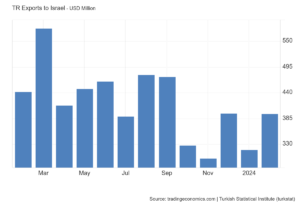Turkey announced on Tuesday that it would impose immediate restrictions on exports to Israel across 54 different categories of products until a ceasefire is declared in Gaza. This move marks Ankara’s first significant measure against Israel after six months of war.

The decision comes in response to Israel’s rejection of Turkey’s request to participate in an aid air-drop operation into Gaza. Turkey has been vocal in denouncing Israel’s campaign in Gaza, which began following a surprise attack by the Palestinian militant group Hamas on Southern Israel on 7 October.
According to latest casualty figures, at least 33207 people, including more than 13000 children, have been killed in Gaza and 1139 have been killed in Israel.
Turkish Ministry of Trade
The Turkish Trade Ministry stated that the restrictions would cover a wide range of products, including steel, iron, jet fuel, construction equipment, granite, chemicals, pesticides and more. The ministry emphasized that these measures would remain in place until Israel declares an immediate ceasefire and allows uninterrupted humanitarian aid into Gaza, in accordance with international law.
Israeli Response
Israel swiftly responded, accusing Turkey of unilaterally violating trade agreements between the two countries. Israel’s Foreign Minister, Israel Katz, criticized Turkish President Recep Tayyip Erdoğan for sacrificing the economic interests of the Turkish people in support of Hamas. Katz pledged that Israel would take necessary steps against Turkey, including banning certain Turkish imports and seeking sanctions from US-based organizations and the American Congress.
ארדואן @RTErdogan שוב מקריב את האינטרסים הכלכליים של תושבי טורקיה למען תמיכתו במרצחי החמאס בעזה שאנסו, רצחו וחיללו גופות של נשים, נערות, מבוגרים ושרפו ילדים בחיים. ישראל לא תיכנע לאלימות ולסחטנות ולא תבליג על ההפרה החד צדדית של הסכמי הסחר ותנקוט נגד טורקיה בצעדים מקבילים שיפגעו…
— ישראל כ”ץ Israel Katz (@Israel_katz) April 9, 2024
Vocal War
The trade restrictions mark the first significant action taken by Ankara against Israel since the conflict began. The strained relations between the two countries were further exacerbated when both states withdrew their ambassadors shortly after the outbreak of hostilities.
The two states have been in a vocal war since then, with Erdoğan calling Israel a “terror state” and denouncing Israel’s occupation of Palestine during an International Court of Justice hearing.
Context and Reactions within Türkiye
President Erdoğan has faced domestic criticism over maintaining commercial ties with Israel during the conflict, something that was understood by many as a factor in his loss is local elections at the end of March. In Istanbul, police detained dozens of protesters demanding an end to trade with Israel, reflecting the growing discontent within Turkey. Erdogan’s stance on the Gaza conflict was cited as a key factor in his party’s losses in local elections, with opposition parties gaining support on a more hardline stance against Israel.
Turkey’s main opposition, the Republican People’s Party (CHP), along with others, supported the decision to restrict exports to Israel, but said the measures were not enough. The CHP has called for a total stop to trade with Israel, while other parties have urged the government to block Turkish airspace and ports to planes and vessels heading to Israel.
Trade Since the Inception of War

Despite tensions, trade between Turkey and Israel has continued. According to data from the Turkish Exporters Assembly (TIM), while trade with Israel has fallen since 7 October, exports to Israel have increased each month in 2024, exports to Israel have increased each month in 2024 (worth $423.2 million in March), although total exports for the first quarter of the year have decreased by 21.6%, compared to the previous year.
The long-term implications of these measures on bilateral relations and regional dynamics remain uncertain.











Comments 1